Chinese Medicines Help Cancer Patients to Cope With Chemotherapy
Chemotherapy works by using drugs to kill cancer cells. In comparison with surgery or radiotherapy, chemotherapy can achieve a more effective result. Cancer-fighting drugs are administered through injection or orally, and travel in the blood to reach to the areas where the cancer cells may have spread. However, because of its less selective approach, chemotherapy will cause more harm to normal tissues and organs. Adverse effects in the blood production system, immune system, digestive system and nervous system will generally appear during treatment, greatly reducing the chance of achieving an optimal outcome. TCM helps patients to tolerate chemotherapy better.
Chemotherapy is associated with a wide range of side effects. Symptoms and extent of the severity vary, depending on the cancer type, chemotherapy regimen and individual physical condition. TCM physicians can make a judgment based on holistic diagnostic techniques, and use herbs to relieve the side effects.
General enhancement during chemotherapy
TCM believes that typical chemotherapy side effects such as dizziness, fatigue, depression, poor appetite, insomnia, dry mouth, urinary and bowel disorders are mostly due to blood and qi deficiencies, as well as under-functioning liver and kidneys. Thus, the appropriate strategy is to invigorate the spleen and stomach so as to ensure production of blood and qi and to nourish the liver and kidneys. Some classic prescriptions can achieve these effects:
Digestive protection during chemotherapy
In TCM, anti-cancer drugs usually lead to under-functioning of the spleen and stomach that causes gastrointestinal symptoms like poor appetite, nausea, vomiting, abdominal pain and diarrhea. Common prescriptions that help to relieve the symptoms are:
When abdominal pain is obvious, add:
yan hu suo |
Corydalis tube |
Rhizoma corydalis |
bai shao |
White peony root |
Radix Paeoniae Alba |
When diarrhea is obvious, add:
shan yao |
Chinese yam |
Rhizoma Dioscoreae |
er cha |
Cutch black catechu |
Catechu |
Bone marrow protection during chemotherapy
Most cancer-fighting drugs result in a certain degree of suppression of bone marrow production, which causes anemia, a low blood count, neutropenia or thrombocytopenia. When this happens, physicians have different herbs to target specific conditions.
|
TCM believes that a decline in red blood cells is attributed to blood and qi deficiencies. Common herbal ingredients to overcome this include: |
| huang qi |
Astragalus |
Radix Astragali |
| dang shen |
Pilose asiabell root |
Radix Codonopsis Pilosulae |
| dang gui |
Angelica root |
Radix Angelicae Sinensis |
| shu di |
Processed rhemannia rhizome |
Rhizoma Rehmanniae Praeparatae |
| shou wu |
Fleece flower root |
Radix Polygoni Mulitflori |
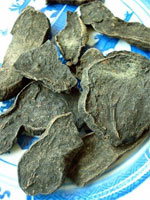 |
|
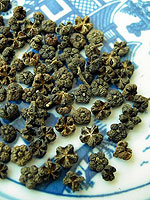 |
|
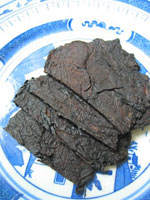 |
| Fleece flower root |
|
Evodia fruit |
|
Processed rhemannia rhizome |
|
A decline in white blood cells should replenish the qi, fortify the spleen, and nourish the liver and kidneys. Common herbal ingredients include: |
|
Decreased blood platelets usually lead to bleeding problems. TCM will solve this by replenishing qi and controlling blood flow, as well as cooling down the blood to arrest bleeding. Common herbal ingredients used include: |
| sheng di |
Fresh rhemannia root |
Radix Rehmanniae |
| nu zhen zhi |
Glossy privet fruit |
Fructus Ligustri Lucidi |
| wu zhu yu |
Evodia fruit |
Fructus Evodiae |
| ji xue teng |
Suberect spatholobus stem |
Caulis Spatholobi |
| da zao |
Common jujube fruit |
Fructus Ziziphi Jujubae |
Liver protection during chemotherapy
Long term or high doses of cancer-fighting drugs will damage liver function causing acute hepatitis, fatty degeneration or cirrhosis . Physicians will aim at clearing heat , eliminating dampness , soothing the liver and gallbladder; common herbal ingredients include:
| yin chen |
Virgate Wormwood herb |
Herba Artemisiae |
| chai hu |
Bupleurum root |
Radix Bupleuri |
| yu jin |
Turmeric root-tuber |
Radix Curcumae |
| zhi zi |
Capejasmine fruit |
Fructus Gardeniae |
| long dan cao |
Chinese gentian root |
Radix Gentianae |
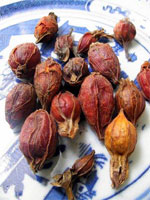 |
|
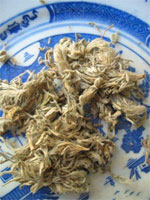 |
|
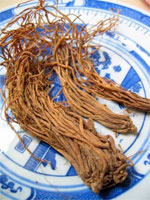 |
| Capejasmine fruit |
|
Virgate Wormwood herb |
|
Chinese gentian root |
Promoting hair re-growth
Hair loss is the most noticeable side effect of cancer treatment; it may be lost gradually over a period of few weeks or it may happen in matter of a few days. Physicians will try to solve the problem by nourishing kidney yin, and replenishing, activating and cooling down the blood. Common herbal ingredients include:
| dan pi |
Peony tree root bark |
Crotex Moutan Radicis |
| sheng di |
Fresh rhemannia root |
Radix Rehmanniae |
| chi shao |
Red peony root |
Radix Paeoniae Rubra |
| dang gui |
Angelica root |
Radix Angelicae Sinensis |
| nu zhen zhi |
Glossy privet fruit |
Fructus Ligustri Lucidi |
Renal and urinary protection during chemotherapy
The side effects and toxicity of chemotherapy drugs remain the most important barriers to completing the chemotherapy regimen. Certain drugs damage the kidneys, especially if used in excessive amounts. TCM has a positive effect in treating kidney toxicity and bladder inflammation; treatment is based on clearing toxic heat, cooling down and arresting bleeding, and inducing urination to expel dampness. Common herbal ingredients include:
| che qian cao |
Plantian herb |
Herba Plantaginis |
| che qian zi |
Plantain seed |
Semen Plantaginis |
| zhu ling |
Chu ling |
Polyporus Umbellatus |
| ze xie |
Oriental water-plantain root |
Rhizoma Alismatis |
| bi xie |
Long yam |
Rhizoma Dioscroreae Septemlobae |
In actual situations, it is more usual to see multiple-system injuries and complicated patient presentations; therefore, an experienced physician is necessary for a detailed check up and an appropriate prescription.
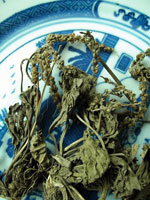 |
|
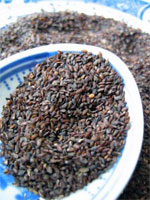 |
|
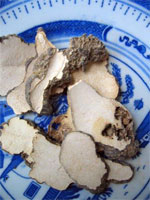 |
| Plantian herb |
|
Plantain seed |
|
Chu ling |
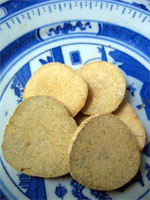 |
|
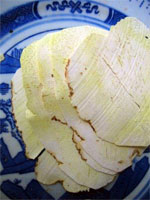 |
|
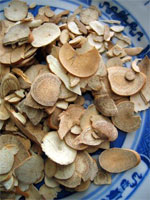 |
| Oriental water-plantain root |
|
Long yam |
|
Combined Spicebush root |
|